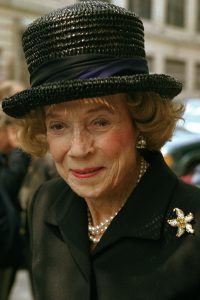 Philip Marshall was devoted to his grandmother, wealthy philanthropist, Brooke Astor. Her victimization by her own son, Philip’s father, Anthony Marshall, created irreparable harm to the relationships in the family. Anthony Marshall and one of his attorneys conspired to divert millions of dollars to Anthony’s benefit after Ms. Astor developed dementia. They were both convicted in criminal court of financial elder abuse. Would you have had the courage to stand up to your own father and take on the cause of justice of your grandmother if you had been in Philip’s shoes?
Philip Marshall was devoted to his grandmother, wealthy philanthropist, Brooke Astor. Her victimization by her own son, Philip’s father, Anthony Marshall, created irreparable harm to the relationships in the family. Anthony Marshall and one of his attorneys conspired to divert millions of dollars to Anthony’s benefit after Ms. Astor developed dementia. They were both convicted in criminal court of financial elder abuse. Would you have had the courage to stand up to your own father and take on the cause of justice of your grandmother if you had been in Philip’s shoes?Philip recently contributed to the American Bar Association’s journal BiFocal, a publication of the Commission on Law and Aging. He wrote a piece in the hope that the telling of his sad family circumstances would continue to contribute to the recognition of elder abuse and exploitation as an insidious and pervasive national problem. Parts of his article are summarized here.
Philip did not start out as an expert in elder abuse. He loved his grandmother, who had always been a donor to worthy causes, being described as “a humanist aristocrat with a generous heart”. In her later years, she was increasingly isolated by the actions of Anthony Marshall. Close friends were denied visits. A long time and caring staff member was fired. Anthony Marshall, Brooke’s only child, had been appointed power of attorney. He used his power to abuse and control her. There were many red flags in Anthony Marshall’s actions. He sold Brooke’s favorite painting, which she had bequeathed to the Metropolitan Museum of Art, one of the objects of her charitable giving in her earlier life. The paining brought millions, two of which Anthony kept as a commission.
Brooke loved her country house, where she hoped to spend her final days. Anthony closed the housed and fired Brooke’s most loyal staff member, her butler Chris Ely. Under pressure from two of Brooke’s closest friends, Anthony reluctantly agreed to reopen the country house, but shortly after that, moved his mother back to her apartment in New York.
Philip was suspicious of what he saw happening and began to speak with more staff and caregivers. He learned that his grandmother’s lifestyle, emotional and physical care and life were being compromised by his father’s actions. He could not bear the damage he witnessed to her psychological and physical well being. He sought advice. He met with his grandmothers’ close friends and decided that something should be done.
Philip petitioned for guardianship. This always presents an uphill battle when the only adult child is in charge and the psychological abuse and neglect are so difficult to prove. The petition was granted and Philip immediately moved his grandmother back to her country house. By the time the petition was granted, his father was forced to return over $11 million in assets and pledged over $10 million to cover any future claims. But the battle was far from over.
Ms. Astor died peacefully in 2007 with friends at her side. Following her death, Anthony Marshall filed papers on court using three codicils (additions) to her will which redistributed almost $100 million to his control. The unbridled greed of Philip’s father was shocking. He was already provided over $60 million in the original will. That wasn’t enough. He had to conspire, forge documents, manipulate and abuse his own mother to get tens of millions more.
The New York DA had evidence of the criminal abuse case and indicted both Anthony Marshall and his attorney, Francis Morrissey. The case went to trial in 2009. Philip had to testify against his father. There were many witnesses to the abuse and financial manipulation. Anthony Marshall was convicted on 15 of the 16 counts against him. All counts but one were upheld on appeal.
At AgingInvesor.com and AgingParents.com, we are vigorous advocates for stopping elder abuse. We applaud Philip Marshall not only for his courage to bring the guardianship petition in the first place, but to continue the battle to honor his grandmother’s legacy of charitable giving, as originally provided in her will. His actions came with a huge emotional and economic cost to himself. But could not live with the injustice he saw. He was willing to air the family’s dirty linen in public. He was willing to take sides and stand up for the vulnerable person with dementia his grandmother had become. Let his story be an inspiration to all of us.
Until next time,
Carolyn Rosenblatt, RN, Elder Law Attorney, Mediator
Dr. Mikol Davis, Psychologist, Gerontologist
